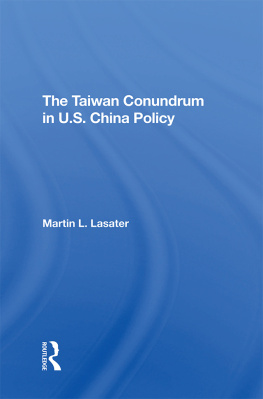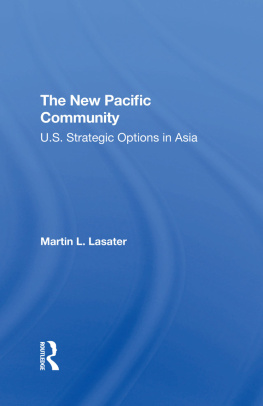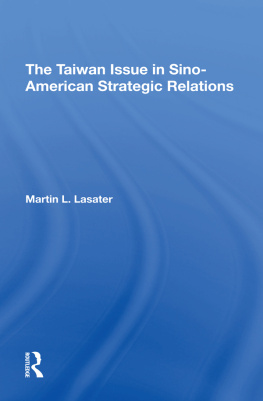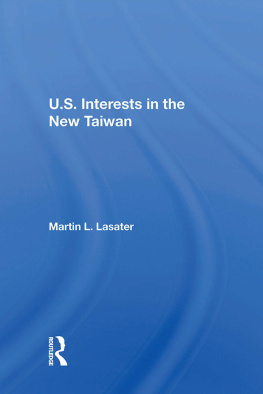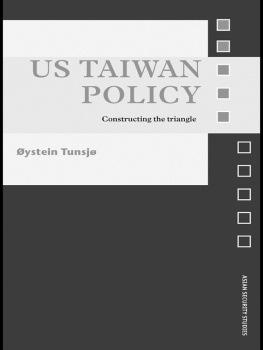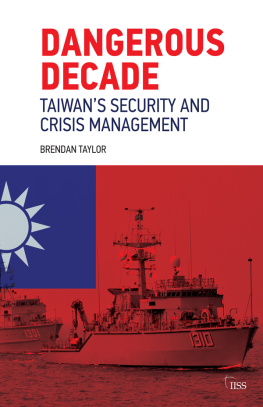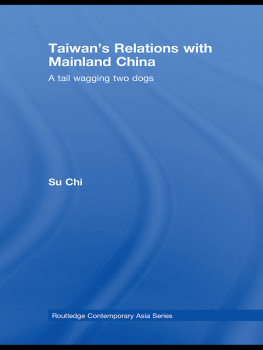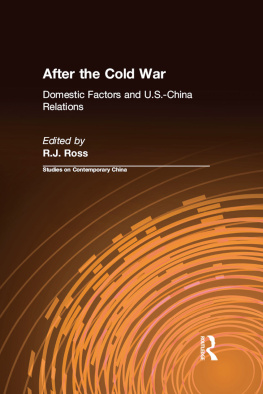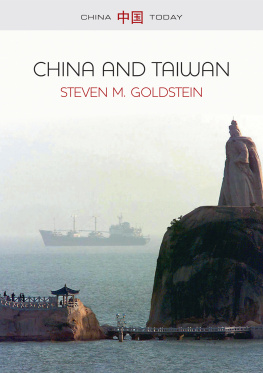The Taiwan Conundrum in U.S. China Policy
First published 2000 by Westview Press
Published 2019 by Routledge
52 Vanderbilt Avenue, New York, NY 10017
2 Park Square, Milton Park, Abingdon, Oxon OX14 4RN
Routledge is an imprint of the Taylor & Francis Group, an informa business
Copyright 2000 Taylor & Francis
All rights reserved. No part of this book may be reprinted or reproduced or utilised in any form or by any electronic, mechanical, or other means, now known or hereafter invented, including photocopying and recording, or in any information storage or retrieval system, without permission in writing from the publishers.
Notice:
Product or corporate names may be trademarks or registered trademarks, and are used only for identification and explanation without intent to infringe.
A CIP catalog record for this book is available from the Library of Congress.
ISBN 13: 978-0-367-28940-9 (hbk)
The central theme of this book is that the ambiguity which characterizes U.S. policy toward Taiwan should continue. Although this ambiguity creates uncertainty when dealing with the Taiwan issue, ambiguity is a proven method of handling the Taiwan conundrum in Sino-American relations: how to maintain friendly, unofficial ties with the people of Taiwan while pursuing the strategically important goal of integrating China into the global community as a cooperative partner of the United States rather than a hostile competitor or foe. In the pages that follow, the argument is made that U.S. values, interests, strategies, and policiesas well as institutional checks-and-balances in the American political systemdictate that the current U.S. "dual-track" approach of engagement with the PRC and support of Taiwan should remain in place, unless and until circumstances arise which compel a fundamental shift in U.S. policy. It is farther argued that, while the PRC, Taiwan, the United States, and the international environment are undergoing significant evolution, the trends at present do not justify the high costs of changing U.S. policy. Nor will they, in all likelihood, justify a change for the next several years.
The feet that Taiwan remains a centraleven explosiveissue in Sino-American relations, fifty years after the founding the People's Republic of China in October 1949 and twenty years after the establishment of U.S.-PRC diplomatic relations in January 1979, proves that the fate of Taiwan is a matter of great importance to both China and the United States. Although Taiwan at times has been a convenient point of contention between Beijing and Washingtonenabling both sides to vent their frustrations while maintaining a dialoguethe importance of Taiwan transcends that utility, although its exact importance is not easy to define and escapes consensus.
For many Chinese, Taiwan is lost Chinese territory which must be recovered if China is to regain its rightful place as the central power of Asia. The recovery of Taiwan is a reflection of national pride, an issue of sovereignty, a matter of strategic significance to China's security, a critical determinant of China's potential as a superpower. From this perspective, a future for Taiwan other than as part of China is unacceptable. Any effort to separate Taiwan from China, whether originating on Taiwan itself or from foreign countries such as the United States or Japan, must be opposed by all means necessary. If Chinese leaders are to be taken at their word, China would be willing to set back its economic modernization and to risk war with the United States to ensure that Taiwan remains part of China. In all likelihood, China would fight over Taiwan because of Chinese values and because of China's interests in Taiwan, although not all American analysts agree with this assessment.
For the people of Taiwan, 98 percent of whom are of Han Chinese ancestry, the future of their home is of vital concern. But what that future should beor perhaps more appropriately can beis a subject of intense disagreement. The so-called "mainlanders," those who came to Taiwan after 1945 and their descendants (roughly 14 percent of the population), are far more attached to the idea of a united China than the so-called "Taiwanese" (84 percent of the population), whose ancestors moved to Taiwan much earlier and who lived under Japanese rule cut off from China from 1895 to 1945 as a result of Tokyo's victory in the 1894-1895 Sino-Japanese War. The majority of Taiwanese, now largely in control of Taiwan's democratic political institutions, seem to favor autonomy from mainland Chinaif not outright independence as a separate nation-state. The younger generations, many of whom are the product of mixed mainlander-Taiwanese marriages and most of whom consider Taiwan their home but view relations with China as necessary or inevitable, fall into various categories of views regarding the future relationship of Taiwan with mainland China. As far as can be determined by election results and repeated polls, the majority of Taiwan residents are pragmatic, preferring to enjoy the stability and prosperity of the status quo in the Taiwan Strait, whereby Taiwan enjoys de facto autonomy, and leaving to the future the determination of Taiwan's political ties with China. Since virtually no one on Taiwan wants to become part of China as long as its central government is controlled by the Chinese Communist Party (CCP), the principle of Taiwan's self-determination is not well received in Beijing. Increasingly, the PRC views developments on Taiwanparticularly efforts by the Republic of China under President Lee Teng-hui to broaden Taiwan's international presenceas threatening the fundamental principle of Taiwan being part of China. Lee's most recent contributionthe concept that all Taiwan residents, regardless of provincial origin, are "new Taiwanese'sis seen by the PRC as yet another example of Lee's traitorous attempts to divide the motherland.
For Americans, the issue of Taiwan is more complexalbeit equally visceral to many. There is no consensus in the United States over the future of Taiwan, in large measure because Taiwan is far away from Peoria and, for those interested, the Taiwan issue is replete with conflicting values and interests. To a great many "average" Americanshard to define numbers or percentages hereTaiwan is a separate country, clearly distinguished from what is still widely referred to as "Communist China." The idea that Taiwan should be forced against its will to become part of Communist China is viewed as being un-American, although not necessarily worth fighting to prevent. Among Americans with greater interest in foreign policy and China policy in particular, the Taiwan issue is a constant reminder of the volatility of domestic and international politics.
This lesson was brought home once again in the 1995-1996 Taiwan Strait crisis, when, for a short while, PRC missiles flew over Taiwan and PRC and U.S. fleets eyed each other warily near Taiwan waters. In large part, the crisis was precipitated by Lee Teng-hui's unofficial visit to the United States in June 1995, a trip seen by many in Beijing as proof of U.S. complicity in Lee's strategy of gaining international support for an independent Taiwan. The possibility of a future military conflict between China and the United States over Taiwan prompted renewed debate among China specialists over an appropriate U.S. policy toward Taiwan. The existing policystill in place since the 1950swas designed to ensure that the resolution of the Taiwan issue would be achieved peacefully between the two sides of the Taiwan Strait.


